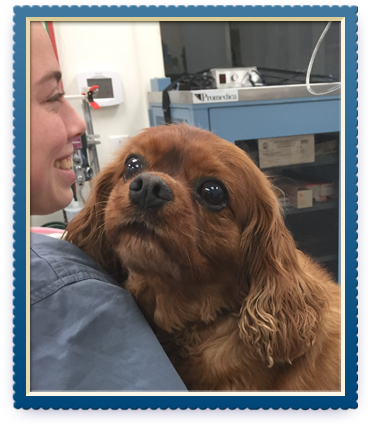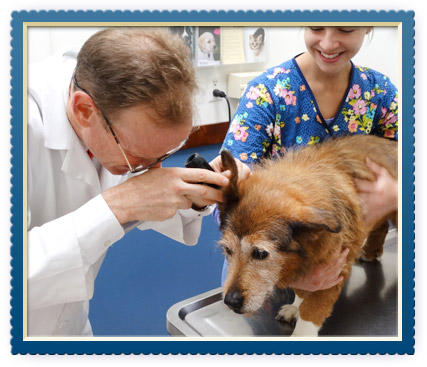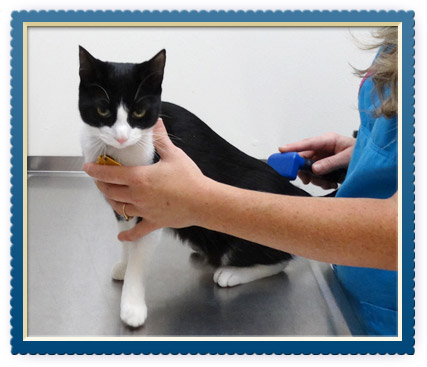Pet Wellness Services
 Why Is Regular Wellness Care for My Pet
Why Is Regular Wellness Care for My Pet
So Important?
Prevention is the key to your pet's long- term health. The veterinarians and medical team at Animal Hospital of Ivy Square recommend that your pet receives a complete wellness examination once per year as a young adult, and twice per year as an older patient.
Regular examinations are our chance to assess your pet's overall health, discuss any changes we see, educate and update you on advancements in medical care and for you to discuss any concerns or questions. If a health problem or issue can be detected in its early stages, there is a far greater likelihood it can be resolved and treated with less difficulty, less expense and greater success.
Wellness for Every Age and Stage
When you bring your pet to Animal Hospital of Ivy Square, we work with you to create a lifetime preventive health care plan based on your pet's breed, lifestyle, age and risk factors.
Due to the many recent discoveries and innovations in veterinary medicine, your pet can be protected against many infectious diseases. Vaccinations and preventative diagnostic tests are important for keeping pets healthy and free from disease. Your veterinarian will determine a vaccination protocol based on your pet's lifestyle, susceptibility to disease, our geographic location, and the most current recommendations from the American Animal Hospital Association Vaccine Guidelines. Our shared goal to is to maintain your pet’s optimal health.
Feline Life Stage Health Care Recommendations
(Click for downloadable PDF)
Kitten (<6 months)Core Wellness
Special Procedures
|
Adult Cat (1 – 7 years)Core Wellness
Special Procedures
|
Senior Cats (8+ years)Core Wellness
Special Procedures
|
Canine Life Stage Health Care Recommendations
(Click for downloadable PDF)
Puppies (<1 year)Core Wellness
Special Procedures
|
Adult Dog (1 – 7 years)Core Wellness
Special Procedures
|
Senior Dog (> 7 years)Core Wellness
Special Procedures
|
At your first visit with your new puppy or kitten, you will also receive a special welcome kit. This kit is filled with valuable health care and behavior training information about your newest family member. Each kit also includes a free month of heartworm and flea prevention.
During each examination throughout your pet's life, we remain committed to listening to your concerns, answering your questions, and keeping you up-to-date on all the information you need to be the best caregiver to your pet. Good communication between you and your pet's doctor is an important way to ensure your beloved companion is receiving the care and attention needed for a long, healthy life.
Your Pet's Golden Years at Home
As for your senior pet, there's an important role for you to play as your pet's primary caregiver. While you cannot control age-related decline, you can influence your pet's activity level, living conditions, access to quality senior veterinary care, and daily nutrition. Following these helpful tips will help preserve your pet's quality of life:

- Avoid excessive weight gain. Talk to your veterinarian about the sources of your pet's daily calories and avoid treats that are high in fat and sodium.
- Keep your pet's living and areas clean, dry and warm at all times.
- If possible, regularly check your pet's mouth for reddened gums, loose teeth or unusual swellings. Check eyes for redness, unusual cloudiness, discomfort and discharge. Check ears for wax build-up, discharge or unusual odors.
- Thoroughly groom and inspect your older pet's skin regularly. Look for lumps, bumps and wounds.
- If your older pet's eyesight is impaired, avoid relocating furniture and changing his or her surroundings. Also, try not to drastically change your pet's daily routine.
- Any changes associated with eating, drinking or elimination should be noted and discussed with your veterinarian, as these may be indicate disease.
- Take your older pet for regular senior checkups, even if he or she seems to be well. It is always easier and less expensive to prevent a problem rather than treat a problem.
The best time to begin your pet's senior care program and recognize the need for a little extra TLC is well before age-related conditions begin to set in. We can make sure you and your faithful companion enjoy many more happy and healthy years together.
Parasite Prevention
Fleas and ticks are more than a nuisance; they carry diseases dangerous to both you and your pet.
Prevalent tick-borne diseases in Charlottesville include Lyme Disease and Ehrlichiosis, which can be significant threats to you and your dog, especially during the warmer months of the year. Ticks and tick eggs live in the grass and weeds. Check and brush your dog after being outside, especially in grassy or brushy areas. If a tick is attached to your dog's skin, remove it carefully with tweezers and wash the affected bite area and your hands afterward.
 Fleas are most abundant during the warm weather; however, if left untreated, they can be a problem year-round. In fact, flea infestation is one of the most common medical problems veterinarians see. Your pet can be allergic to fleas, and just one bite can result in a severely painful skin infection. Fleas can also transmit serious diseases such as bartonellosis (the bacteria that causes “cat scratch disease” in people), and parasites like tapeworms.
Fleas are most abundant during the warm weather; however, if left untreated, they can be a problem year-round. In fact, flea infestation is one of the most common medical problems veterinarians see. Your pet can be allergic to fleas, and just one bite can result in a severely painful skin infection. Fleas can also transmit serious diseases such as bartonellosis (the bacteria that causes “cat scratch disease” in people), and parasites like tapeworms.
The best course of action to protect your pet and yourself from fleas, ticks, and the potential of tick-borne disease is prevention. The latest flea and tick control products are available at our hospital. Your veterinarian can help you choose the correct preventive regimen based on your pet's exposure risks, home environment and health status.
For your convenience, we also provide home delivery of these products on a one-time or reoccurring basis. You can also purchase individual doses of Heartworm and flea and tick preventative medications to ensure your pet is never without protection.
Protecting Your Pet from Heartworm Disease
Heartworm disease is a serious, life-threatening disease transmitted by mosquitoes. It affects dogs and, to a lesser extent, cats. Although Heartworm disease is most common along the Atlantic and Gulf coasts from the Gulf of Mexico to New Jersey and along the Mississippi River and its major tributaries, today it is found almost everywhere in the continental United States.
To best protect your pet's health, our veterinarians recommend heartworm preventives despite the infrequency of the disease in our area. The same medicine the prevents Heartworms from developing also kills and prevents other types of intestinal worms that can infect your dog or cat. For dogs, a once-a-month Heartworm preventive can be given as a chewable treat. Cats are protected by applying a drop of heartworm prevention liquid to the skin once a month.
If you would like more information about the veterinary wellness services Animal Hospital of Ivy Square offers for your pet or to schedule an appointment at our animal hospital in Charlottesville, please call our office at (434) 295-8387 (VETS).